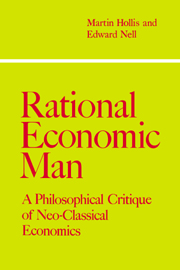Book contents
- Frontmatter
- Contents
- Preface
- Introduction
- 1 Relevance and falsification
- 2 Rational economic man
- 3 Theory and hypothesis
- 4 Facts and theories
- 5 Behaviour and prediction
- 6 A priori knowledge
- 7 Deductive explanation
- 8 The assumptions of neo-Classicism
- 9 Rationalist foundations for economic theory
- Bibliography
- Index
- Frontmatter
- Contents
- Preface
- Introduction
- 1 Relevance and falsification
- 2 Rational economic man
- 3 Theory and hypothesis
- 4 Facts and theories
- 5 Behaviour and prediction
- 6 A priori knowledge
- 7 Deductive explanation
- 8 The assumptions of neo-Classicism
- 9 Rationalist foundations for economic theory
- Bibliography
- Index
Summary
Recruits to the army of orthodox Western economic science accept a twin allegiance. They swear a general empiricism in the pursuit of knowledge and, even if they would not always admit to it, a methodological individualism in the attempt to explain human behaviour. As empiricists, they are to reject the rationalist quest for necessity among truths and inevitability among events. As individualists, they are to reject the social definition of man given by medievalists and mercantilists and refurbished by Marx. In economics, the vanguard of advance, they are to work with a notion of abstract individuals, who choose among abstractly described alternatives. In epistemology they are to insist that theories are justified only by their predictive success. Neither allegiance seems to us wise. We shall argue that neo-Classical theories of economics are unsound and that they rely for defence on a Positivist theory of knowledge which is also unsound. Having sought vainly for a trustier branch of empiricism, we shall finally argue the merits of a Rationalist philosophy and a Classical or Marxian Economics.
Our ambitions and apologies
So bold a thesis needs a scholarly defence in several volumes. Each ingredient has a complex history of subtle argument and each has been studied by authorities whom we cannot hope to rival. But, if debate had to wait for a synoptic papal bull, it would never start. Besides, general judgments formed by default can be as influential as those reached by debate and the influence of empiricism, allied in economics with neo-Classical thinking, is beyond doubt. This is not to deny that empiricists and neo-Classicists have their reasons nor that general argument occurs.
- Type
- Chapter
- Information
- Rational Economic Man , pp. 1 - 21Publisher: Cambridge University PressPrint publication year: 1975



